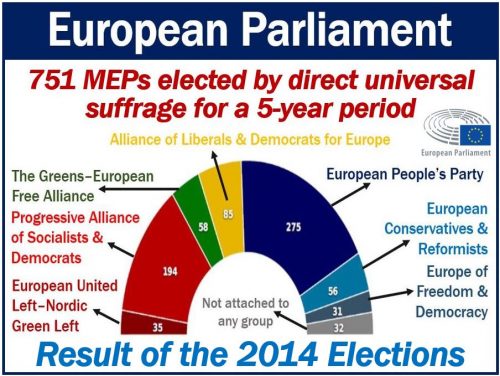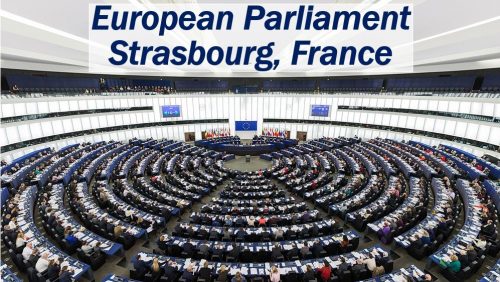The European Parliament is the EU’s law-making body. It consists of lawmakers who the European Union’s electorate elect directly every five years. There are more than 380 million voters in the EU.
EU stands for European Union. The EU is an economic and political union which currently consists of twenty-eight countries. With a population of 510 million, it is the world’s largest single consumer market in monetary terms.
In Britain, we call the European Parliament lawmakers Euro MPs or MEPs. MP and MEP stand for Member of Parliament and Member of the European Parliament respectively.
The Parliament, together with the Council of the European Union, passes EU laws. It receives proposals from the European Commission. It subsequently debates them and determines whether or not they become laws.
The European Parliament decides on enlargements and international agreements. Also, with the Council of the European Union, it establishes the EU budget.
Regarding the composition of the European Parliament, Europa.eu says:
“The number of MEPs for each country is roughly proportionate to its population, but this is by degressive proportionality: no country can have fewer than 6 or more than 96 MEPs and the total number cannot exceed 751 (750 plus the President).”
“MEPs are grouped by political affiliation, not by nationality.”

European Parliament – three main roles
The Parliament has three basic roles: legislative, supervisory, and budgetary.
Legislative
Legislative includes passing EU laws, which it does together with the Council of the EU, and deciding on international agreements.
Parliament also decides on enlargements and reviews the Commission’s work program.
Supervisory
Supervisory includes electing the Commission President and approving the Commission as a body. It also includes the democratic scrutiny of all EU institutions.
Parliament sets up inquiries and examines citizens’ petitions. It also discusses monetary policy with the ECB. ECB stands for the European Central Bank.
Budgetary
The European Parliament establishes the EU budget. It does this together with the Council.
It also approves the EU’s long-term budget.

European Parliament + 3 other institutions
The European Union has four key institutions. Together they run the Union. The four institutions are:
– The European Parliament,
– the European Commission,
– the Council of the European Union, and
